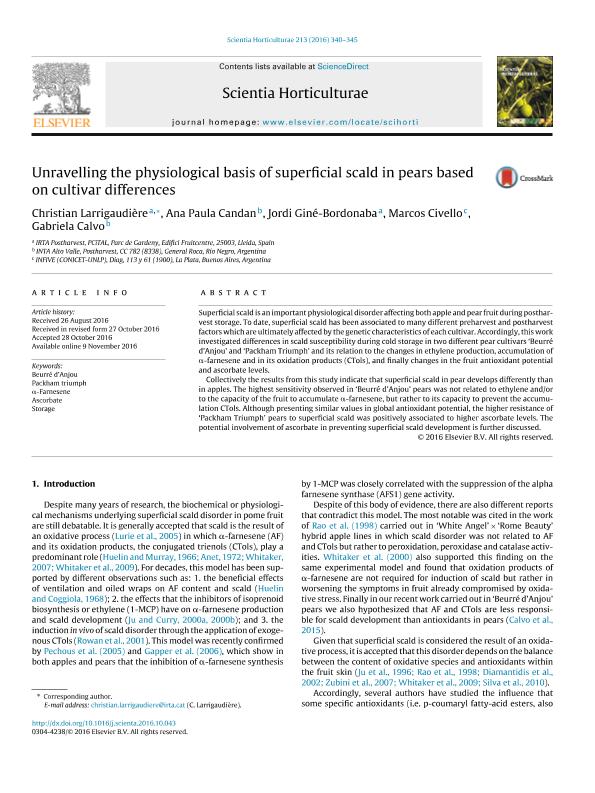Mostrar el registro sencillo del ítem
dc.contributor.author
Larrigaudière, Christian
dc.contributor.author
Candan, Ana Paula
dc.contributor.author
Giné Bordonaba, Jordi
dc.contributor.author
Civello, Pedro Marcos

dc.contributor.author
Calvo, Gabriela
dc.date.available
2017-09-21T20:06:31Z
dc.date.issued
2016-12
dc.identifier.citation
Larrigaudière, Christian; Candan, Ana Paula; Giné Bordonaba, Jordi; Civello, Pedro Marcos; Calvo, Gabriela; Unravelling the physiological basis of superficial scald in pears based on cultivar differences; Elsevier Science; Scientia Horticulturae; 213; 12-2016; 340-345
dc.identifier.issn
0304-4238
dc.identifier.uri
http://hdl.handle.net/11336/24843
dc.description.abstract
Superficial scald is an important physiological disorder affecting both apple and pear fruit during postharvest storage. To date, superficial scald has been associated to many different preharvest and postharvest factors which are ultimately affected by the genetic characteristics of each cultivar. Accordingly,this work investigated differences in scald susceptibility during cold storage in two different pear cultivars ‘Beurré d’Anjou’ and ‘Packham Triumph’ and its relation to the changes in ethylene production, accumulation of -farnesene and in its oxidation products (CTols), and finally changes in the fruit antioxidant potential and ascorbate levels. Collectively the results from this study indicate that superficial scald in pear develops differently than in apples. The highest sensitivity observed in ‘Beurré d’Anjou’ pears was not related to ethylene and/or to the capacity of the fruit to accumulate -farnesene, but rather to its capacity to prevent the accumulation CTols. Although presenting similar values in global antioxidant potential, the higher resistance of ‘Packham Triumph’ pears to superficial scald was positively associated to higher ascorbate levels. The potential involvement of ascorbate in preventing superficial scald development is further discussed.
dc.format
application/pdf
dc.language.iso
eng
dc.publisher
Elsevier Science

dc.rights
info:eu-repo/semantics/openAccess
dc.rights.uri
https://creativecommons.org/licenses/by-nc-sa/2.5/ar/
dc.subject
Ascorbate
dc.subject
Beurré D'Anjou
dc.subject
Packham Triumph
dc.subject
Storage
dc.subject
Α-Farnesene
dc.subject.classification
Bioquímica y Biología Molecular

dc.subject.classification
Ciencias Biológicas

dc.subject.classification
CIENCIAS NATURALES Y EXACTAS

dc.title
Unravelling the physiological basis of superficial scald in pears based on cultivar differences
dc.type
info:eu-repo/semantics/article
dc.type
info:ar-repo/semantics/artículo
dc.type
info:eu-repo/semantics/publishedVersion
dc.date.updated
2017-09-18T14:32:18Z
dc.journal.volume
213
dc.journal.pagination
340-345
dc.journal.pais
Países Bajos

dc.journal.ciudad
Amsterdam
dc.description.fil
Fil: Larrigaudière, Christian. IRTA Postharvest. Lleida; España
dc.description.fil
Fil: Candan, Ana Paula. Instituto Nacional de Tecnología Agropecuaria. Centro Regional Patagonia Norte. Estación Experimental Agropecuaria Alto Valle; Argentina
dc.description.fil
Fil: Giné Bordonaba, Jordi. IRTA Postharvest. Lleida; España
dc.description.fil
Fil: Civello, Pedro Marcos. Instituto Nacional de Tecnología Agropecuaria. Centro Regional Patagonia Norte. Estación Experimental Agropecuaria Alto Valle; Argentina
dc.description.fil
Fil: Calvo, Gabriela. Consejo Nacional de Investigaciones Científicas y Técnicas. Centro Científico Tecnológico Conicet - La Plata. Instituto de Fisiología Vegetal. Universidad Nacional de La Plata. Facultad de Ciencias Naturales y Museo. Instituto de Fisiología Vegetal; Argentina
dc.journal.title
Scientia Horticulturae

dc.relation.alternativeid
info:eu-repo/semantics/altIdentifier/doi/http://dx.doi.org/10.1016/j.scienta.2016.10.043
dc.relation.alternativeid
info:eu-repo/semantics/altIdentifier/url/http://www.sciencedirect.com/science/article/pii/S0304423816305568
Archivos asociados
